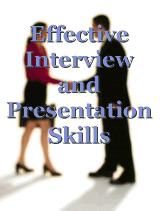Using the Interview Apps
The Interview Trainer and Mock Interview applications are designed to help you do your best during
a job interview. Whether you're seeking a job with a new employer or pursuing a career opportunity
with a current employer, interview skills play an important role you your success.

The Interview Trainer has been designed to help you hone your job interview skills. The Mock
Interview will walk you through a sample job interview. Together, they will help you plan, develop,
and execute a successful job interview strategy.
No matter how well you plan your career strategy or how much time you spend looking for job opportunities,
all of this might land you just a few interviews. In those interviews, you're likely competing with
several other people who posses similar qualifications. It's obvious you have to shine brighter
than the competition in order to get a job offer.
The importance of having good job interview skills cannot be over-emphasized. All other things
being equal, those with the best job interview skills are likely to be the ones hired.
Use of the interview apps will give you a lot of help, practice, and knowledge. But there are
lots of other job interview resources you should explore. We highly recommend reading the eBook
chapters covering interview preparation and interviewing. You'll find additional help in the Tools/Training
menu and elsewhere on this website.
Click on each of the above tabs for highlights of what to do before, during, and after the interview.
Before the Interview
1) Dress Appropriately: As a general rule, it is better to be over-dressed than
under-dressed. Be sure your clothes are clean and pressed, and your shoes polished.
2) Employment Application Preparation: Even though you may have previously provided
a resume and other information, many employers will ask you to complete an employment application
form prior to the interview. Be sure you have all required information. To help you prepare, a sample
Employment Application Form can be found under the Forms menu.
3) Copy of Resume: Always take an extra copy or two of your resume and cover
letter. Things sometimes get lost and having an extra copy is good insurance. It is also recommended
to bring a pen and something to write on - portfolio binders are a good choice in this regard.
4) Be On Time: It is never a good to be late for an interview. You may be viewed
as a person who lacks the ability to plan ahead for contingencies. Don’t ruin an otherwise good
first impression by being late.
5) Plan Enough Time: The interview process often takes longer than people expect.
Plan enough time so you don’t have to worry about being late for another appointment. Also, be sure
you plan your parking arrangements in such a way that you don’t have to pay a parking fine for an
expired parking meter, etc.
6) Remember Names: People appreciate it if you remember their names. This applies
to everyone you meet. Make a mental note of the name of people you are introduced to so you can
recall their names. If you’re not good with names, write them down when you get a chance, or grab
one of their business cards.
7) Pre-Interview Checklist: For more on pre-interview preparation, see the Pre-Interview
Checklist in the Forms menu.
During the Interview
 1) Avoid Appearing Nervous: A big part of overcoming the perception of nervousness is to be aware
of nervous traits and avoid them. If you nervously bounce your foot, keep it firmly on the ground.
If you tend to fidget with your car keys, leave them in your briefcase. You get the idea!
1) Avoid Appearing Nervous: A big part of overcoming the perception of nervousness is to be aware
of nervous traits and avoid them. If you nervously bounce your foot, keep it firmly on the ground.
If you tend to fidget with your car keys, leave them in your briefcase. You get the idea!
2) Watch Your Body Language: Most people are aware of the concept of body language. Basically,
it's how people perceive you based upon clues you give with your body. A classic body language signal
of possible defensiveness is crossing your arms over your chest. If you find yourself feeling a
little defensive about a question the interviewer asks and notice yourself crossing your arms over
of your chest, uncross them and try to relax. If you understand negative body language and nervous
traits, you can consciously avoid displaying them.
3) Show You are Interested: A positive attitude, a firm (not painful) handshake, a smile, and
looking people in the eye when talking with them can go a long way toward inspiring confidence.
Lean forward, keep your head up, and avoid slouching. Sometimes it’s the little things that make
a difference. Don’t overlook simple things or common courtesy when dealing with people.
4) Watch for Clues: Interviewers have a wide variety of skills, backgrounds, and approaches to
the interview process. You won’t know how they will approach your particular interview until the
interview starts. Watch for clues and don't be afraid to ask questions.
5) Anticipate the Unexpected: There are a variety of accepted interview practices, and some that
aren’t so accepted, yet still practiced. You must be prepared to effectively deal with whatever
you are presented with. Don't be thrown off or flustered by an inappropriate or poorly worded question.
Some interviewers will ask stressful questions for the purpose of seeing how you handle stress.
Stay calm and keep moving forward.
After the Interview
 Preparation and practice will go a long way toward improving your interview success rate. However,
there is nothing like the real thing to help hone your skills. To be really effective, however,
you must take the time to formally critique your interviews shortly after they are completed ...
while still fresh in your mind.
Preparation and practice will go a long way toward improving your interview success rate. However,
there is nothing like the real thing to help hone your skills. To be really effective, however,
you must take the time to formally critique your interviews shortly after they are completed ...
while still fresh in your mind.
It is best to write down your impressions immediately after the interview. You might do this
in your car before you leave the parking lot. Consider the following or use our Interview Critique
form:
- Overall, how did things go and why do I feel that way?
- How well did I do in making a good first impression?
- Did I encounter any problems with directions, parking or other logistics?
- Did I utilize good eye contact and avoid any negative body language?
- What questions did I handle best and which ones did I have difficulty with?
- How was my overall rapport with the interviewer and why?
- Did I focus on my strengths, accomplishments and benefits to the employer?
- Could I have handled questions about some of my weaknesses better?
- What skills or accomplishments could I have covered better?
- If I could do one or two things over again, what would they be?
- What is the biggest lesson learned from this interview?
No matter how many interviews you go through, there will almost always be something that can
be improved upon. No two interviews are ever alike. By critiquing your interview performance, you'll
capitalize on your successes and learn from your mistakes. The result will be more confidence and
skill as you progress. By the way, don't forget to follow-up with a thank-you note.